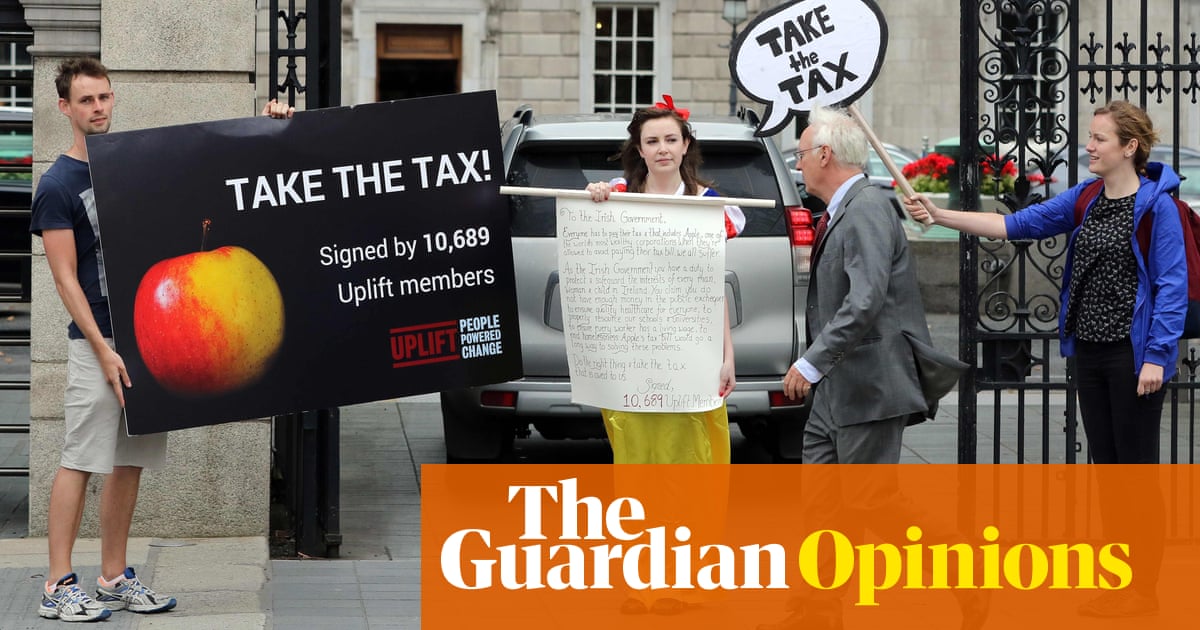For those who may have missed it: last week, the European court of justice ruled that the Irish government will be forced to collect €13bn in tax from Apple. Against its will, Ireland will receive billions in public money after the court ruled it gave the company illegal tax breaks. The money now lies awkwardly in an escrow account, regarded as something of an embarrassment by the government, which was quick to pour cold water on the idea that the money would change its immediate spending plans.
Ireland has only been ruled by governments of the right and centre-right, which are the masters of lowering expectations and periodically insisting the population don sackcloth and ashes. One finance minister from the 1970s, Richie Ryan, cut such a grim figure that he was parodied as “Richie Ruin” and “the minister for hardship”. A few years later, the then taoiseach, Charles Haughey, gave a primetime address to announce that we were “living away beyond our means”. After the 2008 financial crash, another finance minister, Brian Lenihan, neatly shifted blame from his own catastrophic government on to Ireland at large by announcing that, during the boom, “we all partied”.
Economic downturns in Ireland are inevitably framed as morality plays in which the wicked (ordinary people) are punished for their greed (wanting functional public services). The message is clear: nice things cannot happen here. We must obsessively run budget surpluses in admiration and imitation of our German cousins. Extra money cannot and should not be used to fix any of our many social problems.
After 2008, we dedicated ourselves to two tasks with equal gusto: being the best and most subservient little Europeans that ever were, and opening the country up even wider to foreign capital. The former required assuming eye-watering amounts of private banking debts as sovereign debt, and implementing to the letter a “bailout” package imposed from the EU that shredded the social fabric of the country – but maintained our squeaky-clean reputation in Brussels.
The latter was a gamble. The thinking was that the only way to inject some life into our broken economy was to expose it fully to the firehose of international capital. Fifteen years later, the GDP line has gone up, up and up (and there are about 14,000 homeless people). New housing developments are regularly purchased almost in their entirety by foreign capital funds (and the health service collapses every winter). It’s an earthly paradise in which €13bn of free money has no place.
The decision is the culmination of a dispute that has run since 2014, when the European Commission accused successive Irish governments of providing illegal state aid in the form of a bespoke, sweetheart tax deal for Apple, which has been using Ireland as its European HQ since the early 1980s. As the commission said: “This selective treatment allowed Apple to pay an effective corporate tax rate of 1% on its European profits in 2003 down to 0.005% in 2014.”
Apple was merely the most high-profile beneficiary of a decades-old system that enticed US corporations to funnel profits through Ireland, and throw us a few coppers while they did it. The various arrangements acquired all sorts of names, from the cutesy “double Irish” to the vaguely racist “leprechaun economics”. The tax incentives, low corporation tax rates, 100% thresholds, shell companies, and CAIA and BEPS strategies are all outgrowths of our basic economic model since the 1960s: being the best little country in the world in which to evade tax. The basic promise to foreign business is this: set up a modest enterprise here, employ a few people, pay a pittance in tax, and we provide you with a friendly, well-educated, English-speaking workforce, and promise to never, ever bother you or ask for more tax.
The social impact would suggest it hasn’t exactly been an unmitigated success. But admittedly, we had few other options in the middle of the last century, being a small, economically depressed state with few natural resources that had been kept deliberately underdeveloped when ruled from Westminster. This strategy delivered economic growth – but ultimately decimated state capacity. Capacity to build houses, to run effective public services, to really do anything.
So what should the Irish state do with the €13bn windfall? There were plenty of suggestions on social media of how to spend it, from the serious (build a high-speed rail network) to gallows humour (immediately buy 16m iPhones and apologise to Apple). Decades of fantasy economics and paper growth have produced a pessimist malaise, where even when faced with a massive sum of money, people don’t really believe it can or will be used in the right way. Nobody really has a concrete plan for how to transition away from this model, so ingrained is it into every facet of Irish governance. Successive governments are free to haughtily present themselves as sage high priests of “seriousness”, a trait much more highly valued in Irish politics than vision, competence or intelligence.
The Apple case, and our corporate tax structure, is one of the only areas in which Irish governments have openly defied EU institutions. Those two prime directives, of loyalty to the EU and loyalty to US corporations, are finally coming into open conflict. Perhaps while everyone is distracted we could conceivably build a house. Maybe even two.







